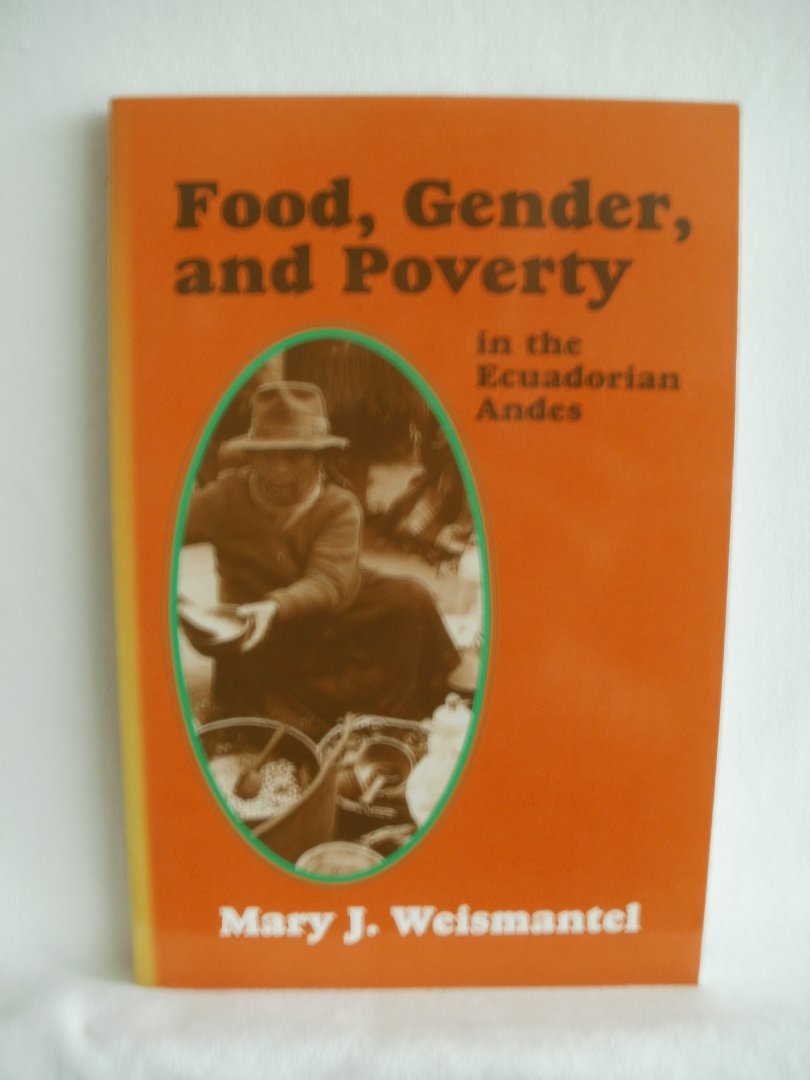Titel
Food, Gender, and Poverty in the Ecuadorian Andes.
Schrijver
Weismantel, Mary J.
Taal
Engels
ISBN
1577660293
Uitgever
Waveland Press Inc., Prospect Heights, Illinois
Prijs
€ 17,50(Excl. verzendkosten)
Bijzonderheden
1998, reissue, 234 pp. paperback, incl. bibliography, index, b/w pictures, condition like new, fading of back cover
Meer info
We are what we eat: our food defines us as individual women and men, as families and communities, and as members of our race, our class, and our nation. In this book, Mary Weismantel uses four different facets of the social life of food--diet, cuisine, discourse, and practice--to draw a richly detailed and compelling portrait of one South American community during the 1980s. The foods eaten in Zumbagua, an indigenous parish of highland Ecuador, are key to understanding what holds this distinctive people together in the face of tremendous economic and cultural challenges, as well as what divides them. The detailed discussion of diet is surprisingly revealing. Ancient histories emerge from the origins of staple crops like barley and potatoes, while recent trends, such as the substitution of purchased candies and colas for too-expensive fruits and vegetables, expose an ongoing ecological and economic crisis. In her discussion of cuisine--the cultural rules by which foods become meals--Weismantel shows how the everyday work of women preparing food transforms a mundane physical necessity, into a deeply meaningful symbolic act. Differences between local and national cultures, everyday and special occasions, men and women, adults and children, family and friends are only some of the cultural messages transmitted through snacks and means. Further, this culinary language is a highly expressive political idiom. By analyzing conversations and arguments about food, this book shows how an apparently apolitical community engaged in agonized debates about survival in the face of endemic racism and accelerating poverty. Cooking oil and wild mustard, bread and gruel, white rice and brown barley all appear as highly charged symbols of assimilation or resistance. Lastly, the book moves into the kitchen itself, where kinship, generation and gender shape--and are shaped by--the practical work of feeding the family. Social changes, such as the feminization of agriculture, continually alter labor demands within and outside of the kitchen, creating new tensions and conflicts within the family. By retaining close attention to the food itself as it is prepared and consumed, this book explores these intimate family issues without ever losing sight of the larger forces involved. The kitchen stove is a final nexus between production, exchange, and consumption. In the end, the delicate balance between the labor and products that go out of the house, and the goods that come back in, determines economic survival. And it is by choosing what to allow in and what to exclude, and how to shape the finished product for their own consumption, that the people of Zumbagua exert a precarious cultural autonomy in the face of daunting difficulties. This book is both a richly specific document of their lives, and a significant theoretical statement about the anthropology of food.
- Alle boeken zijn compleet en verkeren in normale antiquarische staat, tenzij anders beschreven. Kleine onvolkomenheden, zoals een ingeplakte ex-libris of een naam op het schutblad, zijn niet altijd vermeld.
- U handelt deze order direct af met Olive books
- Na uw bestelling ontvangen u en Olive books een bevestiging per e-mail. In de e-mail staan de naam, adres, woonplaats en telefoonnummer van Olive books vermeld.
- De Koper betaalt de verzendkosten, tenzij anders overeen gekomen.
- Olive books kan betaling vooraf vragen.
- Boekwinkeltjes.nl probeert Kopers en Verkopers tot elkaar te brengen. Boekwinkeltjes.nl is echter nimmer partij bij een overeenkomst die gesloten wordt tussen Koper en Verkoper door gebruikmaking van de site. Als u een geschil hebt met één of meer gebruikers, dient u dit zelf op te lossen. U vrijwaart Boekwinkeltjes.nl van enigerlei vorderingen, aanspraken op schadevergoeding en dergelijke, verband houdende met dergelijke geschillen.

